November 25, 2025 | 02:29 GMT +7
November 25, 2025 | 02:29 GMT +7
Hotline: 0913.378.918
November 25, 2025 | 02:29 GMT +7
Hotline: 0913.378.918
Dung Quy Dong is among the few farmers in Binh Phuoc who approach agriculture with a modern and novel mindset. In the early days, he took the bold step of clearing a part of the land that had been used for rubber trees, which were the primary crop at the time, to make way for fruit trees.
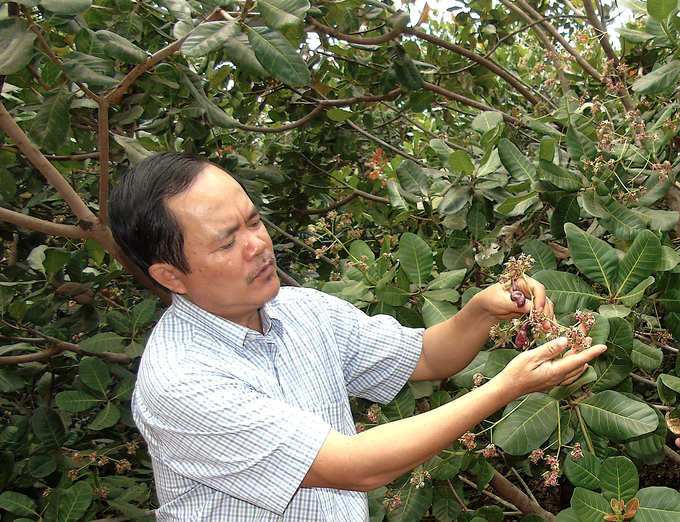
Farmer Quy Dong. Photo: Tuy Hoa.
"In 2011, I decided to convert more than 10 hectares of rubber plantation into a fruit orchard, despite facing disagreement from my family. During that period, the value of rubber latex was deemed satisfactory, however, there was a belief that it would eventually decrease. Durian, a premium fruit, is seen as having great potential by some," said Dong.
As predicted, his forecast came true. Clean agricultural production is becoming an increasingly important focus as consumers seek out food products that come with a guarantee of safety.
Dong's farm underwent years of experimental and selective planting and he decided to attach to four types of fruits that were most suitable including durian, booth avocado, green-skinned pomelo, and tangerine. Having a cashew garden spanning tens of hectares of organic farming seems essential.
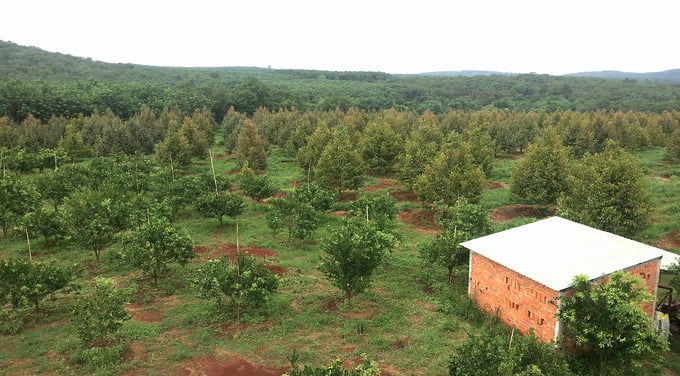
A corner of Quy Dong farm, plots for growing tangerines and durians. Photo: Hong Thuy.
During his visit to the Central Highland Eakmart Fruit Institute, the man learned how to plant an H7 booth and brought it to his farm. This particular type of production has been found to yield significant economic efficiency. Each hectare of land can plant up to 300 trees. In 4-5 years, the harvest is expected to take place. Starting from the seventh year, each tree produces an average yield of approximately 50 kg. At the garden, the current selling price is 50,000 VND per kilogram. As a result, the total revenue generated from the harvest is 750 million VND per hectare. According to Dong, the profit per hectare stands at approximately 600 million VND after deducting the costs.
A 20-hectare area has been divided into separate plots for each type of tree. Rectangular holes measuring 4 square meters have been carefully placed within the plots for composting purposes. These holes are utilized for decomposing leaves, grass, and other decaying waste materials, which are then used to fertilize stumps and replace soil. During the dry season, the pits transform into "lakes" that are utilized for irrigation purposes.
He confided: " Vietnam's agriculture has immense potential due to favorable conditions such as suitable land, soil, and climate for cultivating multiple crops. Despite its potential, the agriculture industry continues to face challenges as it remains small and fragmented. Cultivation through a scientific process is a difficult task.
To achieve sustainable development, it is imperative to adopt a clean cultivation process that prioritizes food hygiene and safety. To produce environmentally-friendly goods, it is essential to ensure that the soil used in the production process is free of contaminants. This is a challenging aspect. In search of pristine surroundings, farmers must venture solely into the depths of the forest. The land is currently undergoing cultivation, however, concerns have been raised over the indiscriminate use of fertilizers and chemical pesticides by farmers over a prolonged period. As a result, the soil has become heavily contaminated with chemicals.
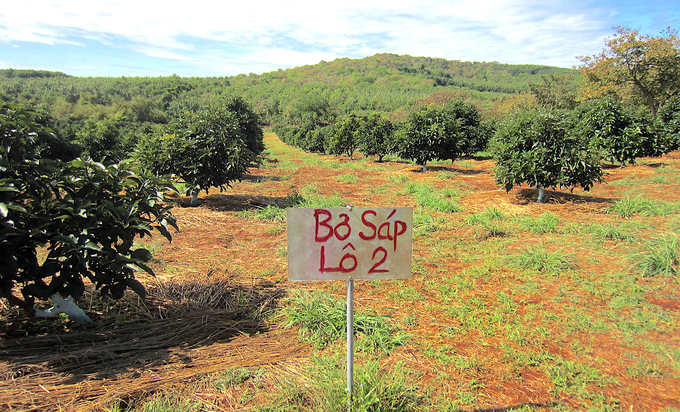
Avocado growing area. Photo: Hong Thuy.
According to Dong, in order to get clean soil, it is recommended to allow the soil to rest for a few years before cultivating crops. Following a specific process for a few years may result in a new product that meets the desired level of cleanliness. In 2011, he began the process of converting rubber plantations to fruit trees. Initially, they only followed the VietGAP process for cultivation. The decision to adopt this process was motivated by concerns for human health and a belief that it represented an inevitable trend toward greater health thinking.
The product can be considered safe if the specified procedure is adhered to. Binh Phuoc province has recently expanded its farming models to include a higher standard model that is now qualified for export to Europe and the USA. This is in addition to their existing VietGAP farming models.
Binh Phuoc boasts over 20% of its land area with topography, climate, and soil that is highly suitable for fruit trees. In order to establish a dedicated region for fruit cultivation, the assistance of the government in the planning process is vital. Once all planning and necessary considerations have been made, the competent authority will proceed to issue a certificate of land use right. This certificate will enable individuals to mortgage their land at a bank in order to secure investment capital. The state has taken measures to facilitate farmers' access to preferential loans, which can aid in agricultural development and enable them to switch to more suitable crops.
Dong emphasized the significance of sustainable development. "As the demand for high-tech agricultural production continues to rise, many are calling for an increase in the number of farmers who engage in this type of cultivation. The need for a clean agricultural process is becoming increasingly apparent and is expected to become a requirement in the near future".
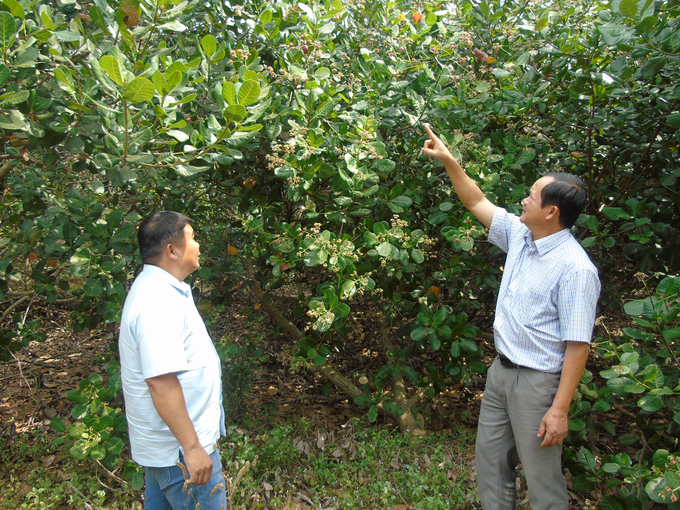
Dong has 10ha of organic cashew. Photo: Tuy Hoa.
I asked, "What should we do then?" In response, he emphasized the importance of selecting suitable plants for every region. "Confining the area of 'saturant' plants like rubber, pepper, cashew, and coffee is deemed crucial. The demand for clean fruits, in particular, is on the rise. Binh Phuoc's soil condition is found to be suitable for premium fruiters like durian, mangosteen, and American avocado", Dong told.
According to Dong, sustainable development requires the formation of cooperatives and cooperative groups that link 4 to 5 farming households. Dong has stated that farmers frequently possess neighboring farming regions, creating a conducive environment for the sharing of knowledge and expertise. Small groups of links are set to be established, laying the groundwork for the emergence of large, specialized farming cooperatives in the future.
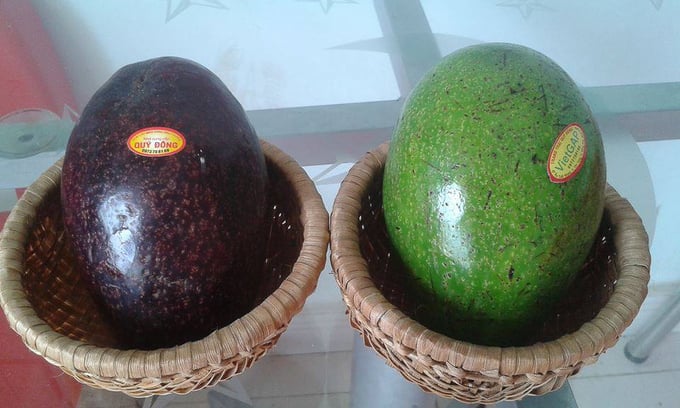
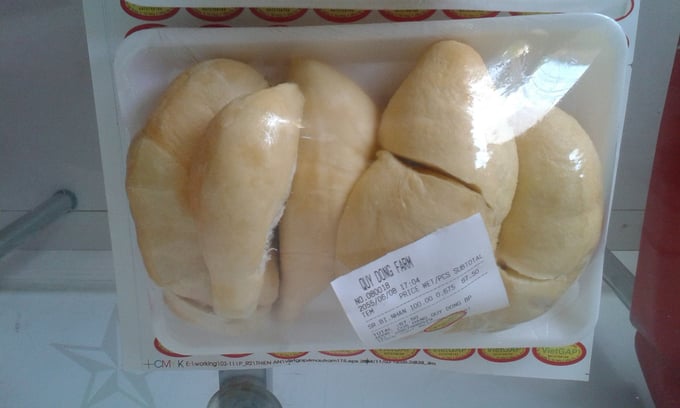
The avocado and durian products of Quy Dong farm have long been recognized by consumers. Photo: Hong Thuy.
Farmers lack significant investment. The cause can be attributed, in part, to concerns surrounding the legalization of land ownership, as well as a shortage of available capital. Farmers are facing a challenge in accessing high-tech agriculture due to a lack of capital to adjust or rebalance their land. The establishment of a high-quality specialized farming material zone necessitates the involvement and collaboration of all sectors and levels for successful implementation.
Creating a model agricultural land and allowing farmers to register for quotas they feel they can achieve is a crucial step toward achieving sustainable development. This initiative aims to identify and designate "gold, silver, or bronze" agricultural areas. If the appraisal agencies in the area meet their income target for the season, the region will be designated as a golden agricultural area for the district or province. This will result in the area being used as a sample agricultural area. As per the statement, other regions looking to plant similar trees will take inspiration from the agricultural methods employed in the sample areas. This will help them avoid any confusion, technical spillover, and inefficiency that may have been experienced previously.
"Enhance production value and cultivate materials sustainably to meet processing demands, minimizing the import of raw materials to ultimately improve the final value," said Dong.
Translated by Linh Linh

(VAN) Green transition is crucial for the Mekong Delta amid climate change and stricter standards, offering a path toward sustainability.

(VAN) Dong Thap promotes agricultural restructuring, forms large specialized farming zones, raises the value of agricultural products and develops toward ecological and high-tech directions.
/2025/11/22/4018-4-213342_747.jpg)
(VAN) The Mekong Delta Agricultural Experts Club has attracted 143 experts and researchers to participate in providing consultancy and contributing initiatives to the development of one million hectares of high-quality rice.

(VAN) Ca Mau’s development of OCOP products opens a path to increasing cooperatives value, helping boost income, expand markets, and affirm collective economy's role.

(VAN) Turning seemingly ordinary coconut shells into unique jewelry and artwork, Nguyen Bang Nhi spreads the value of local culture through her brand, Cocohand.

(VAN) Results from the Sustainable Durian Model Project in Dak Lak have confirmed the critical role of Yara Viet Nam in transferring advanced nutritional solutions to farmers.

(VAN) In Tuyen Quang province, livestock farmers have introduced effective models and innovative practices that significantly strengthen African Swine Fever prevention and control efforts.